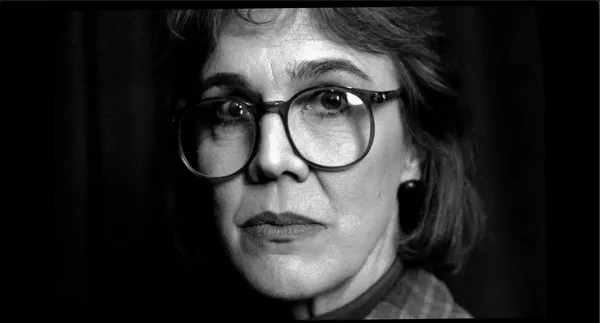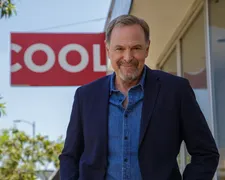 |
| Catherine E Coulson Photo: Richard Beymer |
An accomplished stage actor who transitioned easily to film; a talented director of photography; a devoted rebbetzin, friend and mother; and much loved by viewers around the world as the Log Lady from Twin Peaks, Catherine E Coulson was a remarkable woman who lived a remarkable life. That life is celebrated in actor and director Richard Green’s documentary I Know Catherine, The Log Lady, which recently screened as part of Fantaspoa. Just after the festival, I met with him and observed that there’s so much material in the film that it feels as if it’s spilling over, and it probably could have been a miniseries.
“There is enough for a miniseries,” he agrees. “In fact, the first way we cut this was as a three part miniseries at three and a half hours, which David [Lynch] fell in love with. The reason we ended up making a feature had more to do with what was happening in the streaming world and the consolidation and budgets that changed rather dramatically. We felt that we could reach a broader audience with a feature and still have the power of the central storyline. But you're absolutely right, there's so much material.
“Even in the three and a half hour miniseries, we were saying, ‘Well, we can do all these supplementals because we have wonderful stories.’ David tells a story at one point about Jack Nance and him getting jobs delivering the Wall Street Journal. David had a car. Jack had to get one from Catherine's parents. Catherine and Jack were married at the time. And David got so good at this, while Jack was still putting rubber bands on the newspapers to be able to throw them into the yards, David was done. He would drive his whole route in an hour. Never stop for a stop sign or a red light. He said it was late in the night and Catherine used to go with him because it was like being on a roller coaster. It would just be driving with one hand and throwing.”
Something that really comes across in the film is how close the three of them were for a long time before Twin Peaks. Did that make it difficult to figure out where to start the story?
“For me, there was a natural point,” he says. “I moved up to San Francisco at 18 and started a theatre company at 19 that had many of the people that had been in the Circus. And once we started – that second theater company is called Theater of Marvels – we did a lot of work with Commedia Dell'Arte and all the different theatre companies. Great productions of Threepenny Opera, Of Mice And Men. Once that theatre company started, everybody who had been in Circus was now a part of our theatre company. So these people that you see in the movie, in Circus and then in Eraserhead, these became my theatrical family. And it's lasted all these years.
“That's how I met Catherine. And that's how we interacted as a family over the years. Catherine made it possible for us to do David Lynch Presents, I Don't Know Jack, the documentary she and David helped us make about Jack Nance, Eraserhead star. And also she was instrumental in getting me hooked up with David to do Mulholland Drive. He used to watch me do improvised verse with an English accent in a theatre here in Los Angeles called the Mayfair Music Hall. And then years later, he wrote a part that had all these different parts of our friendship and our interaction over the years, building friendship, in it. So that was really the starting point for me.
 |
| Richard Green |
“When I heard the call when she calls the mortuary, that just became the opening of the movie and the way to open our brains up to Catherine. This is an extraordinary person.
“Catherine and I were kind of cousins in a big family. I'm sure you have a cousin you don't see but once every couple of years, and you really don't even know what colour hair they have now or what they're doing with their life. With Catherine, I had more contact, but I didn't know that much about her. I knew of her presence. I could feel her when we hung out. And there was a time up at the Twin Peaks Fan Festival, I think it was 2003 or something like that, we spent some time together, but now...now I think I know her better than most of her close friends, just in terms of facts, not in terms of emotion or history or real memories or anything like that.
“One of the things that was so extraordinary was she did 22 seasons at the Oregon Shakespeare Festival, and she was a major community leader. And I've had people coming up to me the last four days just telling me ‘I didn't know this,’ ‘I didn't know that.’ ‘Oh, I've always known Catherine.’ It was wonderful to be in a town full of people who loved the movie. They showed it every day of the festival, and then the theatre where the festival was held held it over for the rest of this week.
“One of the first interviews that I conducted was with Will Haugse, who's in the film. We had conducted a couple of interviews before, when he decided that he wasn't the right guy to direct it, which I agreed with. Then I conducted the interview with David, and I was absolutely convinced that it was going to be a really interesting film.
“Both David and I felt the same way. We didn't want it to be about Twin Peaks. We wanted it to be about Catherine because her life was larger than Twin Peaks. So we did almost 65 interviews, something like that, and it took about a year and a half to get the interviews. I didn't watch season three of Twin Peaks when it came out, and I didn't go back to Twin Peaks at all until I had conducted over 60 interviews and had a shape of her life. And then I watched Twin Peaks from beginning to end, looking for the moments that would resonate with what I felt were the other aspects of her life. So I kind of protected my vision from Twin Peaks, knowing how powerful and encompassing it is and how beautiful it is. It's so nice to have that footage in the movie. It's a lovely thing.
“I think the most important thing to her, and I relate to this, was her child. Being a really, really good mom, being there, being present, giving her the tools that Catherine had acquired in her lifetime for how to deal with many things. And it's wonderful. Now Zoe [Catherin’s daughter] has gotten involved with the World Wildlife Foundation, and she's putting the log on display. The actual log and glasses are going to be up there at the Hollywood Theater in Portland. I'm going to fly to Portland for a day for that and help make that happen.
“Catherine was just extraordinarily present. She would always be there if somebody needed her. She was the rabbi's wife in this community, and as I understand it, it's a rabbi's wife, the rebbetzin, who is the person who does the community outreach. Who, when someone is sick, brings the cake or the soup or whatever. And Catherine was brilliant at that job. Many people from the temple came up to me over the last four or five days and told me stories as well. So I think human interaction was just incredibly important to her. Also the work. She was totally committed and into it, and a brilliant actress.”
I tell him that I found it fascinated to learn, in the course of the documentary, about the technical work that Catherine did behind the camera.
“It’s never talked about and she was so good at it.” He nods. “Right. And when you watch the film you get the impression that she was an assistant camera only. In fact that’s not the case. She shot for 60 Minutes, she shot a number of films. She didn't have a major feature film career as a DP, but she shot a lot and was just really good at it and sensitive about it. Sensitive to who the performers were and how to get those shots. The DPs that I spoke to that worked with her, not only Fred Elms, were just fascinated by how confident they could be that they were going to get what they needed.”
There’s an amazing story that David Lynch tells about how Catherine nearly died years earlier. Richard tells me that when it came up in their interview, it was the first time he had ever heard it.
“It wasn't like I knew that was coming and I asked for it,” he adds. “I had no idea. That's the wonderful thing about David Lynch. He was a world class storyteller and a brilliant director, but also just a one on one storyteller. I'm known for telling a pretty good story and we would match each other day to day. He was amazing. And that came out of nowhere. And it, you know, it's a three part story. I just asked one question and then I got this extraordinary story of him saving her life. And by the way, that scene was shot in the apartment where it happened. We didn't score it and I didn't cut it hardly at all because he's such an amazing storyteller.”
Catherine defied the odds on that occasion, and when she learned that she had cancer, she was equally determined.
“She made an incredible impression on people around her. Again, in the three part we have got Joe Romano, brilliant composer and musician, who was her chemo buddy up there. He tells stories about how she would be in the chemo room helping everybody else deal with their illness, but also how it knocked her down.
“You know, one of Catherine's friends who I asked to do an interview a long time ago expressed her concern that I was going to make a hagiography which I had no idea what it was, but it turns out it's a biographical puff piece, and I never wanted to do that. The hard parts, the places where delicacy was needed, were the places around the cancer, what kind of cancer it was, how it impacted her on a day to day basis. That was a little delicate because there's some tough stuff there.”
From what he’s been told, he says, he thinks that she was actually hit harder by the break-up of her marriage shortly before that. “I think that she lost some of that exuberance and some of that confidence and some of that empathy. And this is just purely my speculation, but that getting sick gave her a rallying point. It became ‘I have to take care of my daughter. I have to do my best to stay alive for Twin Peaks. I have to put my affairs in order and see my friends.’ And I think she lost any of the sense of defeat and upset that she'd had prior to that.”
Catherine was successful in holding out until she could film a final scene for the return of Twin Peaks, which David arranged for her to do from her home. She died on 28 September, 2015, during a lunar eclipse.





















